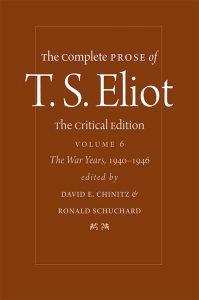
This month sees the publication of The sixth volume of The Complete Prose of T. S. Eliot covering The war years, 1940-1946. The volume, published online by The Johns Hopkins University Press, includes twenty-seven works that were previously unpublished and a further thirty-eight that were unrecorded in Donald Gallup’s bibliography and are likely to be unfamiliar to Eliot’s readers. It can be accessed here.
Edited by David E. Chinitz and Ronald Schuchard, The war years, 1940-1946 reveals Eliot’s response to the extraordinary pressures of total war. Much of his work of the period was composed under circumstances or for purposes dictated by World War II, and the war remains the grim background for his prose whether he was writing on the ballet, the book trade, Kipling, Poland, or Poe. The latest pieces in the volume bring Eliot to the brink of another global conflict: the Cold War.
The first part of The War Years includes 129 works under the heading “Essays, Reviews, Addresses, and Public Letters.” It is a sign of Eliot’s cresting reputation as a figure of cultural significance and of his consequent value as a speaker that fully a quarter of these works were written as lectures or radio broadcasts. Freed from the obligation to write commentaries and reviews for the Criterion, which he had shuttered in 1939, Eliot was able to distribute his attention more widely—a fact that may help to account for the thirty-two letters he fired off to the editors of various periodicals during these years. The remaining items in Part I are exceptionally diverse generically, including not only the headlined essays, reviews, and addresses, but prefaces, introductions, newsletters, autobiographical documents, position papers, a controversial pamphlet, a telegram, an advertisement, a wry social comment in the form of a limerick, and an article written as cultural propaganda for a magazine airdropped into occupied France by the Royal Air Force. Across a number of these pieces, Eliot begins to explore the ideas that will coalesce in 1948 as Notes towards the Definition of Culture.
The second part of the volume comprises transcripts and summary reports by others of four lectures for which Eliot’s original text is lost; the third comprises fifteen letters and documents of which Eliot is one of several signatories.
The Complete Prose of T. S. Eliot: The Critical Edition gathers for the first time in one place the collected, uncollected, and unpublished prose of T. S. Eliot.


